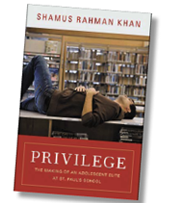Sociologist examines a new American elite

Shamus Rahman Khan, an assistant sociology professor, is interested in elites. As a graduate of St. Paul’s School, one of the most prestigious boarding schools in the nation, he thought that by going back there for a year to teach, he would have the perfect subject for his research on what it means to be elite in 21st-century America.
What he found surprised him and is the subject of Khan’s new book, Privilege: The Making of an Adolescent Elite at St. Paul’s School.
“The school was much more racially diverse, but even though it was more democratic, it was unequal in a new way,” he says. “The kids were richer than ever before, and that class difference is the big, new barrier to access at the top. Racial and ethnic diversity doesn’t equate to mobility and equality.”
The context for his research is the growing income disparity in the United States between the very richest Americans and the average earner. Over the past 40 years, even as great gains in racial and gender equality have been made, the incomes for the richest 10 percent of Americans have grown nearly 100 percent. Meantime, the rest of American earners have seen only a 3 percent increase over that period, according to the Economic Policy Institute at the University of California, Berkeley.
Khan calls this “democratic inequality,” and it is at the heart of a resurgent field in social science research that he is leading with fellow Columbia sociology professor Sudhir Venkatesh and Dorian Warren, a political science professor at the University. These scholars contend that even though America has become a more open society, class still plays a major role.
The son of Pakistani and Irish immigrants—Khan’s father was a successful surgeon and his mother a nurse—Khan grew up in a wealthy suburb of Boston, where his upwardly striving parents made sure he had private music lessons, trips to Europe and other cultural enrichment. When he enrolled in St. Paul’s in fall 1993, he found himself assigned to the minority student dorm, surrounded mostly by black and Latino boys from poor, inner-city neighborhoods.
He notes that his Pakistani heritage “hardly afforded one oppressed minority status,” yet he was still astonished by what he saw on the campus outside Concord, N.H., which has been attended by generations of America’s wealthiest and best connected families, from Vanderbilts to Rockefellers.
“Children with multiple homes who chartered planes for weekend international trips, came from family dynasties, and inherited unimaginable advantages met me on the school’s brick paths,” he writes. “My parents’ newfound wealth was miniscule compared to many at the school.”
He expected to find the same patterns when he went back, the old-fashioned ideas of entitlement based on family dynasties, connections and cultural refinement. Instead, he discovered a “new elite” at his alma mater, one that includes more women and minorities and is distinguished by a sense of privilege rather than entitlement. He decided to study how this sense of privilege is conveyed to students and came up with three key lessons.
Kids at St. Paul’s and other elite institutions learn that social hierarchies still exist, but they can be treated like ladders, not ceilings. They learn that experiences matter. And they learn how to feel comfortable in just about any social situation, as is required in an integrated and open society that values hip-hop and opera, Beowulf and Jaws.
“The irony is that it’s not the elites that are now culturally exclusive,” Khan says. “The disadvantaged in society are the ones who are more culturally limited. That seems to reinforce their position, because they don’t have the knowledge they need to move up the class ladder, no matter how talented they are.”
Khan, however, doesn’t buy the narrative that the new elite has ascended to the top rung of American society, which we think of as a meritocracy, on the basis of innate intelligence and drive. He ascribes it to “differences in opportunity,” such as better schools, academic coaching, after-school enrichment programs and a supportive home environment. He also notes that such advantages are increasingly out of reach for everyone but the very wealthy. At some point, he wonders, “Do we have a moral responsibility to address this inequality?”
He believes the answer is yes. “I am among those who believe that too much inequality is both immoral and inefficient.”
Provided by Columbia University


















